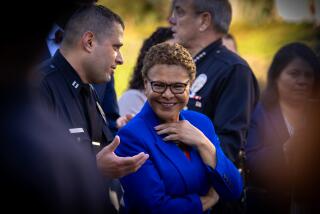Editorial: Fixing LAPD’s broken police discipline system is as important as finding a new chief
As important as the selection of a new Los Angeles police chief is, and it is indeed important, local officials are facing a decision that in the long run could prove every bit as crucial to the future of policing in this city.
At issue is the police discipline process, one of three essential elements in the oversight of officer conduct — and alleged misconduct. The civilian Police Commission determines whether a disputed action was within department policy. The district attorney decides whether to prosecute the action as a crime. But a three-member Board of Rights determines what sanctions the officer might face at work, deciding whether the officer committed misconduct and if so, whether to uphold or override whatever discipline the chief recommended.
Afterward, the chief may soften the discipline, but cannot increase it.
Despite pressure locally and nationally for sharper scrutiny of uses of force, L.A. voters moved in the other direction last year, allowing officers to choose to have their cases heard by Boards of Rights consisting of three civilians. That might on its face promise tougher reviews than the current makeup of one civilian and two LAPD supervisors, but the record of the last 20 years shows civilian members to be consistently more supportive of accused officers than are police officials. The Police Protective League — the officers’ union — knew that and pushed for the change, which voters adopted in one of the lowest-profile elections in L.A. history May 16.
It is impossible to say with certainty what voters were thinking when they approved Charter Amendment C. But the prospect of more civilian oversight surely looked to many as if it were a step toward greater, not lesser, scrutiny of officer actions. Voters, in other words, may have been deceived.
It’s late — but it’s not too late.
Before the vote, the City Council went through the motions of considering broader changes to police oversight, but its actions made clear that it supported giving greater control over the discipline process to the union, which tends to reward or punish council members at reelection time.
It was an opportunity lost. The council ignored decades’ worth of studies and recommendations on changes to the process that could allow greater public scrutiny and more effective review of officer actions.
For example, the court-appointed monitor under the Rampart consent decree held in 2005 that Boards of Rights already were too lax and that the police chief should mete out punishment against wayward officers without board interference. Others have proposed empowering the Police Commission to have a more direct role in officer discipline.
At this point it’s late — but it’s not too late. In adopting the ordinances needed to implement Charter Amendment C, the council can decide what skills and experience the board’s civilians must possess. Will the pool include civil rights lawyers? Police reform activists? Police supporters? The City Council will set the rules.
And nothing blocks the council from going further. It can advocate changes to the state laws that closed formerly public police discipline proceedings and records. It can consider the failed and the successful practices of review boards put in place by departments in other cities. And crucially, as it prepares to consider the nomination of a new police chief, it should decide just how much power that chief ought to have over the actions of the city’s paramilitary police force, and just how much power the officers and their union ought to have over the panel that decides whether to back up the chief’s personnel decisions.
Council members can also do something they failed to do in the months leading up to the election: Read and debate the recommendations of a succession of individuals and groups that studied the discipline process, including, for example, the report of the Rampart Independent Review Panel from 2000.
The council’s committee on police reform meets to discuss the issue Tuesday evening at 6 p.m. in City Hall. It is the first time for the panel to take up the issue since Charter Amendment C was approved by voters last year.
This time, we hope the council will take its duties more seriously than it did with its long but superficial hearing before the vote.
We hope as well that Los Angeles’ civic establishment, which was so intimately involved in police reform when it first proposed civilian participation in the review boards in 1992, will engage again. Those leaders were remarkably quiet when the Police Protective League proposed the change that was adopted last year.
It is possible to support the police and still insist on high standards and a discipline process subject to public scrutiny. Fairness to officers is crucial, but a police department is not a typical city agency, and the public interest is paramount.
Follow the Opinion section on Twitter @latimesopinion and Facebook
More to Read
A cure for the common opinion
Get thought-provoking perspectives with our weekly newsletter.
You may occasionally receive promotional content from the Los Angeles Times.










